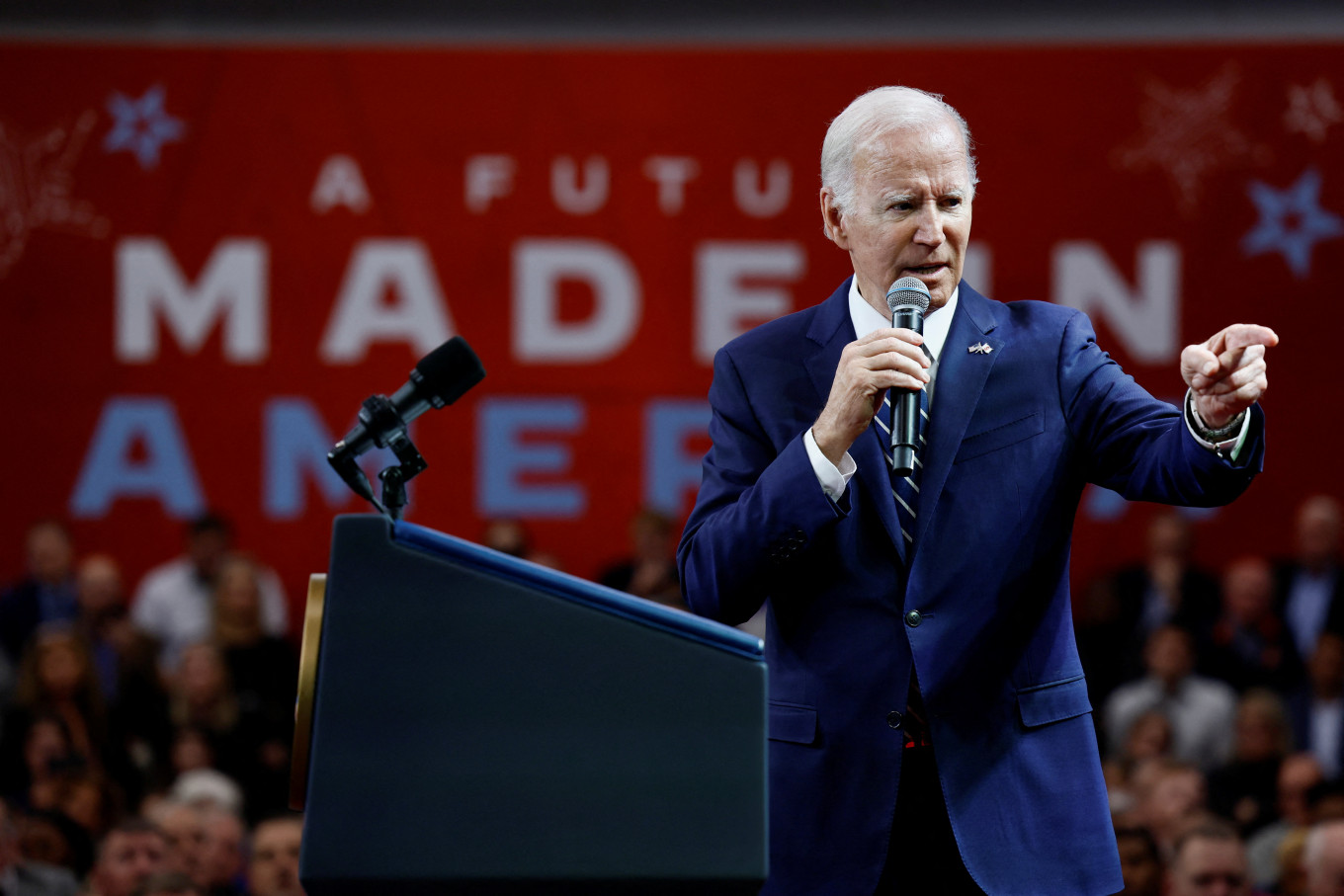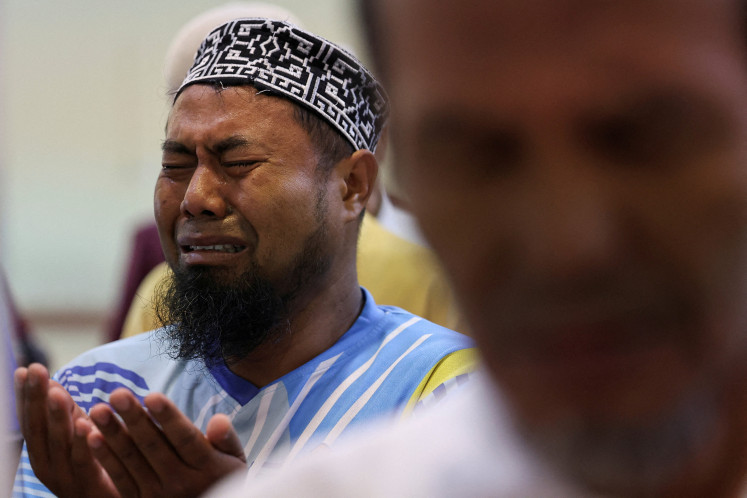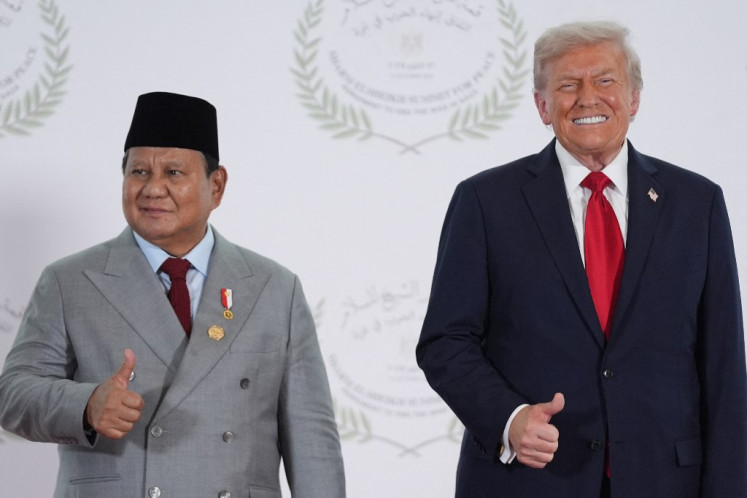Popular Reads
Top Results
Can't find what you're looking for?
View all search resultsPopular Reads
Top Results
Can't find what you're looking for?
View all search resultsBiden has ‘no intention to sit down’ with Putin in Bali
United States President Joe Biden has "no intention" of meeting with Russian President Vladimir Putin next month while attending the G20 Summit, as the two states continue to clash over the Ukraine war, dimming prospects for full attendance at the Bali summit.
Change text size
Gift Premium Articles
to Anyone

United States President Joe Biden has "no intention" of meeting with Russian President Vladimir Putin next month while attending the G20 Summit, as the two states continue to clash over the Ukraine war, dimming prospects for full attendance at the Bali summit.
"He has no intention to sit down with Vladimir Putin, and that's where we are today," National Security Council spokesman John Kirby said on Thursday.
The statement came as the Pentagon released its National Defense Strategy, emphasizing that Russia's invasion of Ukraine was an "acute threat" posed by Moscow while China was the most consequential challenge for the United States.
The dangers are both conventional – Moscow's aggression toward its neighbors and Beijing's efforts to gain control of Taiwan – and nuclear, with Russia possessing an extensive arsenal and China's stocks of atomic weapons growing fast.
US Defense Secretary Lloyd Austin highlighted the different challenges posed by China and Russia as he unveiled the unclassified versions of several military strategy documents.
China "is the only competitor out there with both the intent to reshape the international order and, increasingly, the power to do so," Austin said, as quoted by AFP.
"Unlike China, Russia can't systemically challenge the United States over the long term. But Russian aggression does pose an immediate and sharp threat."
Indonesia has hosted a turbulent G20 forum this year following Russia’s invasion of Ukraine in February. The West, led by the US, has called for Russia to be barred from the forum.
While representatives of all G20 countries have been attending the meetings, the war in Ukraine has created major tensions.
Putin forcibly annexed four regions of Ukraine in October after a set of widely condemned referendums as Kyiv vowed to battle on and pushed for expedited NATO membership.
In recent weeks, Russia has unleashed a wave of missile and drone strikes, hitting Ukraine's energy infrastructure and forcing power cuts in Kyiv and other places.
In an updated report on US nuclear posture released in parallel with the National Defense Strategy, the Pentagon defined the role of its nuclear arsenal as deterring both nuclear and non-nuclear attacks that have strategic consequences.
Putin has played down a nuclear standoff with the West, insisting that Russia has not threatened to use nuclear weapons but has only responded to nuclear "blackmail" from Western leaders.
"Ahead is probably the most dangerous, unpredictable and at the same time important decade since the end of the Second World War," he said.
But Biden expressed skepticism, asking in an interview with NewsNation, "If he has no intention, why does he keep talking about it? Why is he talking about the ability to use a tactical nuclear weapon?"
The US Nuclear Posture Review emphasizes that China's nuclear arsenal is growing but says Russia's is currently more extensive.
Biden’s reluctance to meet with Putin was a departure from a statement earlier this month when he said it “remains to be seen” whether he would speak directly with Putin at the Bali summit. The White House also previously said the possibility of such a meeting between the two leaders had not been ruled out.
President Joko “Jokowi” Widodo has repeatedly expressed optimism that Biden, Putin and Chinese President Xi Jinping will come to Bali for the summit.
Putin noted on Thursday that he had not yet decided whether to attend the summit.
The Russian leader added that if he did not go to the summit, scheduled for Nov. 15-16, he would send a high-level Russian delegation in his place.
Having just secured a historic third term as leader of the ruling Chinese Communist Party, Xi sent a more peaceful message this week.
He hinted at a possible meeting with Biden in Bali, saying that as major powers, China and the US should strengthen communication and cooperation to help provide global stability.
The two countries have been at odds over China's policy towards Taiwan, China's relationship with Russia and, more recently, US efforts to prevent its semiconductor companies selling technology to Chinese companies.
China was recently incensed by a string of visits by US lawmakers to Taiwan. China said the US was sending "dangerous signals" on the democratically governed island that China claims as its own.
"The world today is neither peaceful nor tranquil," Xi wrote in a congratulatory letter to the National Committee on US-China Relations, some of his first remarks since the Congress, according to Chinese state broadcaster CCTV.
Biden on Wednesday said "the United States does not seek conflict with China".










